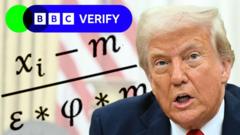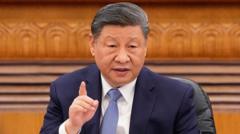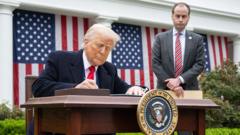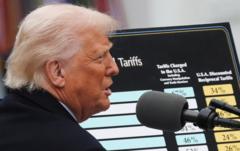Leaders from various nations, including the EU and China, have condemned the tariffs as detrimental to the global economy and expressed their intent to respond collectively.
World Leaders Unite Against Trump's Tariffs as Global Tensions Escalate

World Leaders Unite Against Trump's Tariffs as Global Tensions Escalate
President Trump's newly announced tariffs have ignited widespread criticism and concerns among world leaders, prompting discussions of potential countermeasures.
In a move that has sparked international outcry, U.S. President Donald Trump announced a sweeping 10% tariff on all imports starting April 5, accompanied by even higher tariffs for around 60 nations beginning April 9. European Commission President Ursula von der Leyen proclaimed the decision a "major blow to the world economy," warning that it would lead to damaging economic repercussions for millions globally, particularly affecting vulnerable nations.
Countries such as China have voiced strong opposition, threatening "resolute countermeasures" to protect their economic interests. They are set to face tariffs as high as 54%, compounding existing levies. Trump's rationale for imposing these tariffs centers around a belief that they will redress unfair trade practices and bolster American manufacturing, a stance he believes will "make America wealthy again."
European nations have expressed their discontent, with leaders like French President Emmanuel Macron labeling the tariffs a "brutal" decision that jeopardizes both European and American prosperity. Germany is preparing a unified response within the EU framework, indicating that retaliation could be on the horizon if discussions do not yield satisfactory results.
Even some of Trump's allies, such as Italy's Giorgia Meloni, disagree with the move, asserting the need for compliance through negotiation to avert a potential trade war. The tariffs are anticipated to impact a broad array of economies, with leaders from nations as varied as Canada, Japan, and Brazil already mapping out their counter-strategies.
Notably, the Prime Ministers of Australia and Canada have already warned that U.S. consumers may ultimately bear the brunt of higher prices resulting from these tariffs. Meanwhile, the international community is bracing for escalation as more countries prepare to respond to the evolving trade landscape. The tariffs could reshape global trade dynamics, as numerous nations seek avenues for reciprocity or retaliation through organizations such as the World Trade Organization.
In the wake of this tumultuous announcement, fears of an escalating trade war have led to calls for collective action, emphasizing that when one nation is targeted, all may retaliate in defense of their economic interests, signaling a challenging period ahead for global trade relations.
Countries such as China have voiced strong opposition, threatening "resolute countermeasures" to protect their economic interests. They are set to face tariffs as high as 54%, compounding existing levies. Trump's rationale for imposing these tariffs centers around a belief that they will redress unfair trade practices and bolster American manufacturing, a stance he believes will "make America wealthy again."
European nations have expressed their discontent, with leaders like French President Emmanuel Macron labeling the tariffs a "brutal" decision that jeopardizes both European and American prosperity. Germany is preparing a unified response within the EU framework, indicating that retaliation could be on the horizon if discussions do not yield satisfactory results.
Even some of Trump's allies, such as Italy's Giorgia Meloni, disagree with the move, asserting the need for compliance through negotiation to avert a potential trade war. The tariffs are anticipated to impact a broad array of economies, with leaders from nations as varied as Canada, Japan, and Brazil already mapping out their counter-strategies.
Notably, the Prime Ministers of Australia and Canada have already warned that U.S. consumers may ultimately bear the brunt of higher prices resulting from these tariffs. Meanwhile, the international community is bracing for escalation as more countries prepare to respond to the evolving trade landscape. The tariffs could reshape global trade dynamics, as numerous nations seek avenues for reciprocity or retaliation through organizations such as the World Trade Organization.
In the wake of this tumultuous announcement, fears of an escalating trade war have led to calls for collective action, emphasizing that when one nation is targeted, all may retaliate in defense of their economic interests, signaling a challenging period ahead for global trade relations.





















